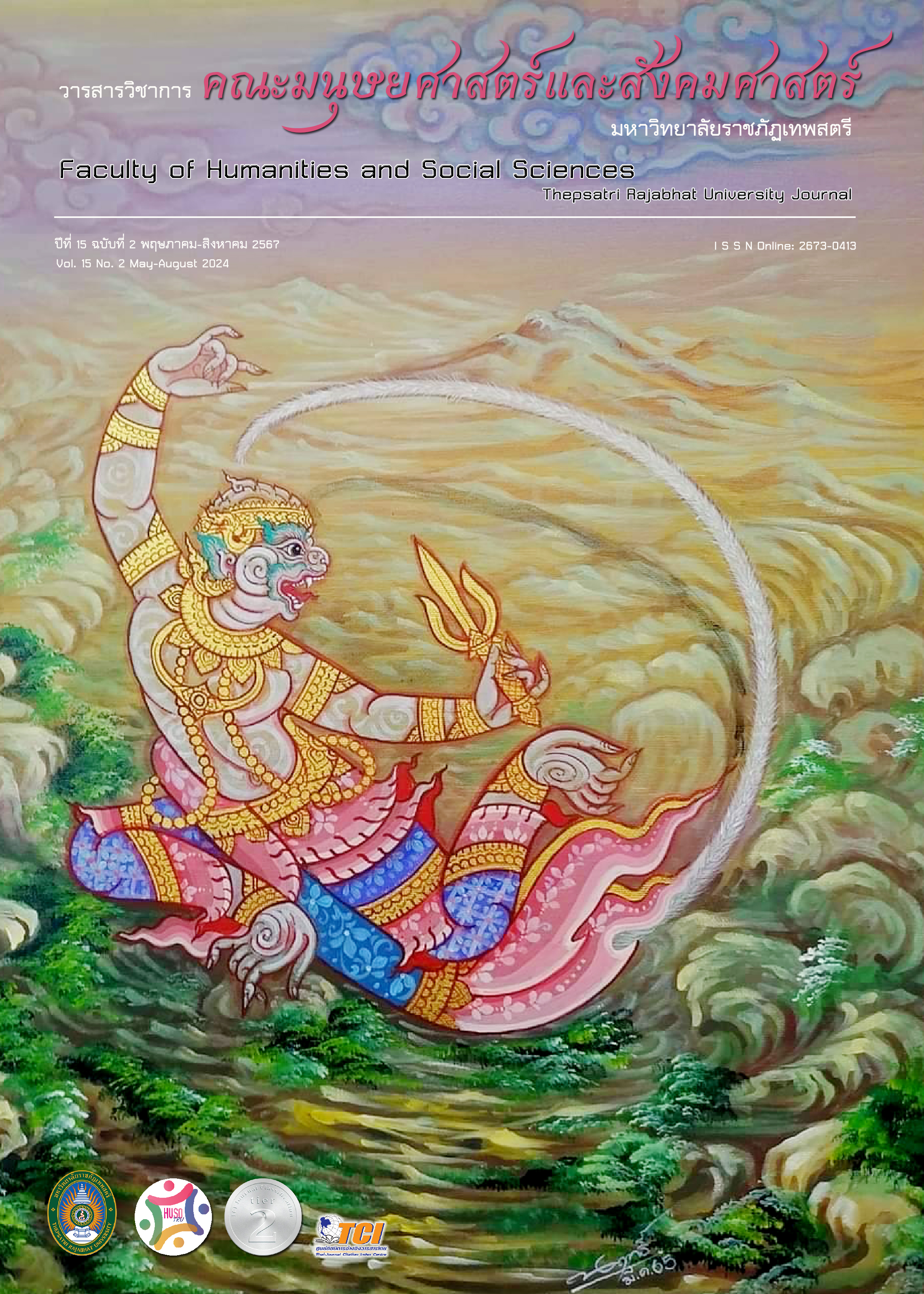The Evaluation of the Project on the Development of Mechanism for Academic Supports and Network on Implementing the Buddhist Ways to Good Health: A Moral – Thai - Sufficiency Economy - Oriented Way
Main Article Content
Abstract
The objectives of this research were to: 1. assess the context, input, process, product, and outcomes of the project, and 2. investigate the problems encountered and the factors contributing to the project's success using the CIPP Evaluation Model. The first stage of the research involved assessing these four factors and identifying the problems faced by the project. Data were collected through a questionnaire administered to 68 executives from 13 provinces involved in the project. The data were analyzed using percentage, mean, standard deviation, and content analysis. The second stage focused on assessing the factors contributing to the project's success. This involved a national forum for information exchange, attended by 61 participants, and a local forum with 52 successful project participants sharing their experiences. Data were collected through workshops and in-depth interviews and analyzed using content analysis. The assessment revealed that: 1. Overall, the project was rated as highly appropriate. The context and outcomes were rated as the most appropriate, followed by the input and process, which were considered very appropriate. The main challenges to project success included 1) staff being unable to fully commit to the project due to multiple responsibilities, 2) patients or at-risk individuals missing scheduled appointments, and 3) complicated budget procedures. 2. The factors contributing to the project's success were 1) staff, 2) budget, 3) curriculum, and 4) management. As a result of the project, over 60% of patients or those at risk of hypertension and diabetes were able to maintain desirable blood pressure and blood sugar levels.
Downloads
Article Details

This work is licensed under a Creative Commons Attribution-NonCommercial-NoDerivatives 4.0 International License.
The content and information presented in articles published in the Academic Journal of the Faculty of Humanities and Social Sciences, Thepsatri Rajabhat University, are solely the opinions and responsibilities of the respective authors. The editorial board of the journal neither necessarily agrees with nor assumes any responsibility for such content in any manner whatsoever.
All articles, information, content, and images published in the Academic Journal of the Faculty of Humanities and Social Sciences, Thepsatri Rajabhat University, are the copyright of the journal. Any person or organization wishing to reproduce, disseminate, or otherwise utilize all or any part thereof must obtain prior permission from the Academic Journal of the Faculty of Humanities and Social Sciences, Thepsatri Rajabhat University.
References
กรฐณธัช ปัญญาใส, พิชามญชุ์ ภูเจริญ, และณิชกมล เปียอยู่. (2560, มกราคม – มิถุนายน). การประเมินผลการสร้างเสริมสุขภาพประชาชนกลุ่มเสี่ยงโรคเบาหวานและโรคความดันโลหิตสูง. วารสารวิทยาลัยพยาบาลพระปกเกล้า จันทบุรี, 28(1), 51 - 62.
เนื้อทิพย์ หมู่มาก, ศริญญา ชาญสุข, และณัฐิยา ไกยนารถ. (2564, กรกฎาคม - ธันวาคม). ปัจจัยที่มีความสัมพันธ์กับพฤติกรรมสุขภาพของกลุ่มเสี่ยงโรคไม่ติดต่อเรื้อรัง เขตสุขภาพที่ 8 กระทรวงสาธารณสุข. วารสารพยาบาลตำรวจ, 13(2), 427 - 433.
เบญจพร วัฒนศิริเวช. (2564, มกราคม – มิถุนายน). ประเมินผลโครงการปรับเปลี่ยนพฤติกรรมการใช้ยาของผู้ป่วยเบาหวานชนิดที่ 2 เครือข่ายบริการสุขภาพอำเภอเปือยน้อย จังหวัดขอนแก่น. วารสารสำนักงานสาธารณสุขจังหวัดขอนแก่น, 3(1), 103 - 115.
ปณิธาน กระสังข์, และจีระศักดิ์ ทัพผา. (2564, กรกฎาคม - ธันวาคม). ผลของการประยุกต์ใช้รูปแบบการสร้างเสริมสุขภาพด้วยหลักวิถีธรรมผู้ป่วยโรคไม่ติดต่อเรื้องรัง ชุมชนตำบลบ้านฉาง อำเภอเมือง จังหวัดปทุมธานี. วารสาร มฉก.วิชาการ, 25(2), 180 - 195.
ประมวล เหล่าสมบัติทวี, และสาโรจน์ ประพรมมา. (2563, กุมภาพันธ์ - พฤษภาคม). การพัฒนานวัตกรรมโปรแกรมมะขาม 3 รุ่น การป้องกันและควบคุมโรคเบาหวานในพื้นที่นำร่องของจังหวัดชัยภูมิ. วารสารวิชาการ สคร. 9, 26(2), 72 - 85.
ปาจรีย์ ผลประเสริฐ. (2554). การเขียนและประเมินโครงการ. กำแพงเพชร: คณะวิทยาการจัดการ มหาวิทยาลัยราชภัฏกำแพงเพชร.
ผดุงศิษฏ์ ชำนาญบริรักษ์, ลดาวัลย์ เลนทำมี, กิตติศักดิ์ ไกรจันทร์, สาคร อินโท่โล่, และวิภา วิเสโส. (2563, กรกฎาคม - กันยายน). การประเมินผลโครงการพัฒนาเครือข่ายพยาบาลชุมชนในการขับเคลื่อน อำเภอจัดการสุขภาพของเขตสุขภาพที่ 7. วารสารคณะพยาบาลศาสตร์ มหาวิทยาลัยบูรพา, 28(3), 16 - 26.
ภัทระ แสนไชยสุริยา, และคณะ. (2562). รายงานผลการศึกษาโครงการทบทวนสถานการณ์ และผลการดําเนินงานป้องกันและควบคุมโรคไม่ติดต่อเรื้อรังในประเทศไทย พ.ศ. 2560 – 2562. กรุงเทพฯ: กรมควบคุมโรค กองโรคไม่ติดต่อ.
มยุรี หอมสนิท. (2561). NCD โรคไม่ติดต่อ...ปรับพฤติกรรม ปลอดภัยจาก NCD. สืบค้น มกราคม 2, 2566. จาก https://www.si.mahidol.ac.th/th/healthdetail.asp?aid=1122.
มูลนิธิอุทัย สุดสุข. (2564). โครงการพัฒนากลไกสนับสนุนวิชาการและเครือข่ายขับเคลื่อนนโยบายสุขภาพดี วิถีใหม่ วิถีธรรม วิถีไทย วิถีเศรษฐกิจพอเพียง. กรุงเทพฯ: นนทบุรี.
เยาวดี รางชัยกุล วิบูลย์ศรี. (2551). การประเมินโครงการ แนวคิดและแนวปฏิบัติ (พิมพ์ครั้งที่ 6). กรุงเทพฯ: จุฬาลงกรณ์มหาวิทยาลัย.
สำนักโรคไม่ติดต่อ. (2560). แผนยุทธศาสตร์การป้องกันและควบคุมโรคไม่ติดต่อระดับชาติ 5 ปี (พ.ศ. 2560 - 2564). กรุงเทพฯ: อิโมชั่น อาร์ต จำกัด.
สาโรจน์ ประพรมมา. (2563, มกราคม - มิถุนายน). ผลของโปรแกรมวิถีธรรม วิถีไทยในการปรับเปลี่ยนพฤติกรรมสุขภาพของประชาชนกลุ่มเสี่ยงโรคเรื้อรังในพื้นที่บริการของโรงพยาบาลส่งเสริมสุขภาพตำบลแห่งหนึ่งอำเภอภักดีชุมพล จังหวัดชัยภูมิ. วารสารสมาคมวิชาชีพสุขศึกษา, 35(1), 56 - 68.
สมคิด พรมจุ้ย. (2563). เทคนิคการประเมินโครงการ (พิมพ์ครั้งที่ 7). นนทบุรี: จตุพร.
อุทัย สุดสุข, ธีรพร สถิรอังกูร, พัชรีย์ กลัดจอมพงษ์, และบุษบา ใจกล้า. (2564, พฤษภาคม - มิถุนายน). พัฒนารูปแบบการสร้างเสริมสุขภาพดีวิถีพุทธ เพื่อป้องกันและควบคุมโรคไม่ติดต่อเรื้อรัง. วารสารวิชาการสาธารณสุข, 30(3), 438 - 450.
Round R., Marshall B., & Horton K. (2005). Planning for Effective Health Promotion Evaluation. Melbourne: Victorian Government Department of Human Services.
Stufflebeam, D., L., & Shinkfield, A., J. (2007). Evaluation Theory, Models, and Applications. San Francisco: Jossey-Bass.
Stufflebeam D., L. (2015). For Applying CIPP Evaluation Model Checklist: A Tool The CIPP Model to Assess Projects and Programs. Retrieved May 31, 2023, from http://rszarf.ips.uw.edu.pl/ewalps/dzienne/cipp-model-stufflebeam2015.pdf.


